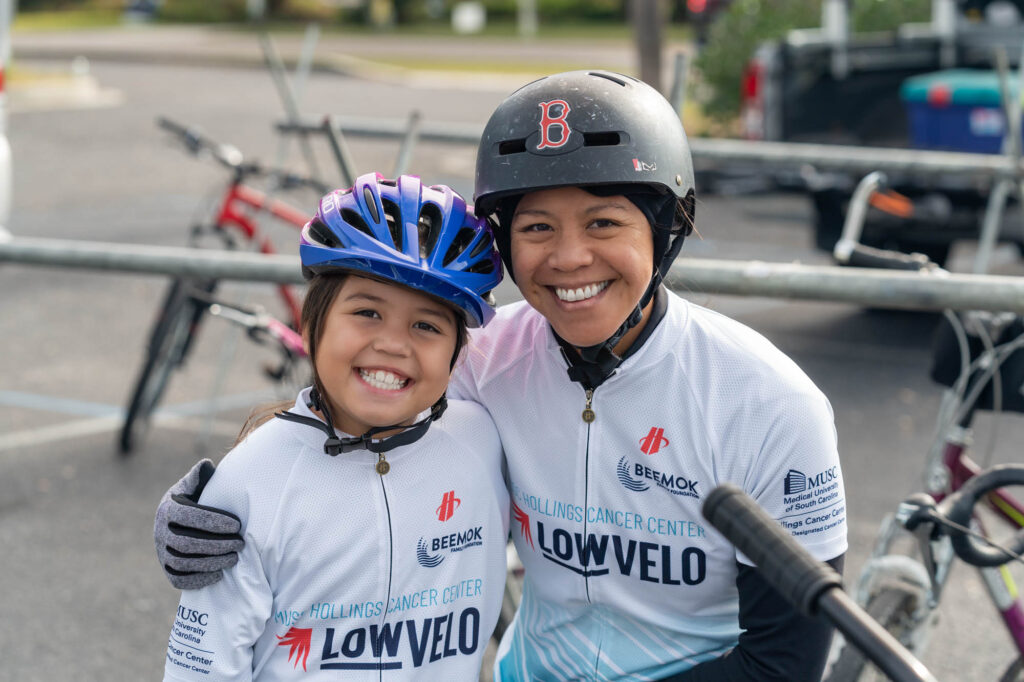Rider-raised dollars fund innovative hereditary cancer research

As South Carolina’s only National Cancer Institute-designated cancer center, the innovative research happening at MUSC Hollings Cancer Center impacts patients not only in the state, but throughout the entire country. With 100% of all rider-raised funds benefiting cancer research, LOWVELO supports a wide variety of research projects as well as fellowships and scholarships to help train the next generation of cancer researchers.
In 2022, Hollings Cancer Center researcher Caitlin Allen, Ph.D., MPH, was awarded $25,000 from LOWVELO for her project, “Implementation Mapping for Managing Patients at High Risk for Hereditary Cancer.” Below, she discusses her research and the impact LOWVELO has on the future of cancer care.
What is your background and how did you decide to pursue a career in medical research?
I am originally from Columbus, OH and have been in the Southeast for the majority of my adult life. I went to Davidson College in North Carolina for my undergrad and then I completed my master’s and Ph.D. at Emory University before coming to MUSC. I was a biology major in undergrad and that’s much more bench science, but the work that I do now as an implementation scientist is much more applied. So, my work has certainly evolved, but I would say my interest in the scientific process has been instilled in me since I was young. I still remember, going back all the way to eighth grade, when our science teacher taught us the research process and how to develop your problem, research, hypothesis, experimental design and conclusion. And so, I had a lot of exposure to the scientific process early on and had an appreciation for that. I did not know necessarily that I would be doing public health and the specific type of work that I’m doing now.
It sounds like you had some great teachers at a young age!
Oh, yes. Ms. Biswas was my eighth-grade science teacher. I fell more in love with science in high school, specifically biology, with Ms. McGlocklin. I had wonderful teachers during my formative years.
Teachers can make all the difference in whether a child loves a subject or not. Switching gears a bit now— did you know about LOWVELO before you received this funding?
I knew of the concept of bike rides to raise money for cancer research, since I had friends from home ride the Pelotonia through The James at Ohio State University. I know LOWVELO is a newer opportunity for MUSC and was excited about being funded in this way.
Can you tell us a bit about your research that was supported by LOWVELO funds?
The project, “Implementation Mapping for Managing Patients at High Risk for Hereditary Cancer,” was created because no standard workflow existed for managing patients with pathogenic variants that put them at higher risk for hereditary cancers. So, follow-up care for individuals with pathogenic variants is logistically challenging and results in poor guideline adherence. To address this challenge, we created clinical management strategies for individuals identified at high risk for hereditary cancers. We used implementation science strategies to support new clinical offerings through the Hollings Hereditary Cancer Clinic for individuals and families at high risk of developing cancer. We used implementation mapping, a systematic, stakeholder-engaged approach to identify patient- and provider-level needs for cancer prevention, test strategies to address these needs, and developed an evaluation plan to assess the new care model.
Can you tell me more about what you were able to accomplish?
This was really a pragmatic project. I was able to partner with Kevin Hughes, the director of the Hollings Hereditary Cancer Clinic, and it was serendipitous timing, where he was interested in starting up this clinical program. So, we met and discussed the value of a hereditary cancer clinic at Hollings Cancer Center, and about my expertise and background and implementation science. I said, ‘Well, you know, we could incorporate implementation science methods to help the processes of getting this clinical offering established and really study the process of standing up this type of service.” So, what I think was unique is that I was able to, as a Ph.D. researcher, collaborate with a clinic and study those processes and best practices for establishing this type of clinical offering. It not only helped get the clinic up and running, but it also could be used to support the establishment of other similar clinical offerings either at MUSC or in other sites.
Additionally, the Hollings Hereditary Cancer Clinic has seen 488 individuals since opening and has had steady growth in the number of patients seen per month. In May of 2023, 58 patients were seen and in April 2024 we saw 197 patients.
What are the next steps for this program?
We are excited about how we’ve leveraged the LOWVELO support to further research about hereditary cancer. We are collaborating with the University of Utah to implement a tool that identifies individuals at MUSC who are eligible for genetic testing based on their family history but have yet to receive this service. Other planned projects include implementing technologies such as chatbots to help educate individuals about the importance of genetic testing, as well as answer questions after they have received their results.
What did the LOWVELO funding mean to you and your project? What did it make possible?
Aside from what I already mentioned, I think what was really cool about receiving the funding is that we were able to work with graduate students. I shared earlier how important mentors and teachers were in my own development as a scientist, so I think about the importance of training our next generation of investigators. I was able to collaborate with and help train a graduate student using the data that we gathered from the project. She started as a master’s student and has since transitioned to a doctoral student. I think it has made a huge impact in that important step of training the next generation of cancer investigators.


